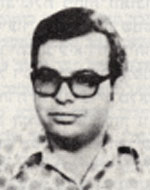Silberstein, Yosef
Joseph, son of Miriam and Solomon, was born on 6.11.1948 in Hungary, and immigrated to Israel with his family in the year 5717. He studied at the Hamed elementary school in Meron, continued his high school studies at the Be’erot Yitzhak religious high school and graduated from the Yavneh High School. His family, they affectionately called him Yoske, while his friends at school called him Yossi. Yossi was a sensitive and quiet boy. As a child he had to struggle with the difficulties of absorption and adjustment, which were his lot as a new immigrant in Israel. His face recognized him as a non-native, said one of his classmates, adding that Yossi was deeply rooted in the timidity and shyness of the native of the Diaspora. These qualities were added to his seriousness and purpose, for he endeavored with all his might to integrate into the social and cultural life of the country. As a boy who knew the taste of childhood abroad, Yossi greatly appreciated freedom and national pride. Once, during the Six-Day War, he passed a group of soldiers on his way home from school. The soldiers called out to Yossi and his friend, who were “religious evaders.” Yossi came home, but his head was full of insult and insult. He refused to continue studying. Only after the war did he return to study and finish his studies. No one imagined then that Sosheka would prove at the cost of his life that he was not evading. Yosef was drafted into the IDF in early November 1967. After completing basic training, he completed a tank-related course and was assigned to the armored corps as a liaison sergeant with the rank of corporal, When he came home for a short vacation, he always wanted to help his family and friends, and his whole being radiated love and warmth, and when he was released from regular service, Yossi decided to choose his future path. In the mornings, Yoshka worked first as an accountant and later as a teacher at the local school He took great care of his students, meticulously prepared the curriculum material and instructed with enthusiasm and vigor, and when he was called from time to time for reserve duty, he did not complain or grumble, knowing that each and every man must bear the security burden.In the summer of 1973 Yoshka decided to marry His wife and his date of marriage were set for October 23, 1973. No one imagined that the dream would come true: When the Yom Kippur War broke out, Yosef was called to his unit when he was in the synagogue. The parting was hasty and excited; Joseph was confused, and asked, as if he did not believe: “Did not they call me?” – He was sent to the southern front and participated as a tank-link in the battles of containment and break-in. In his last letter to his family, he wrote that he felt great and hoped to attend his wedding ceremony. On October 18, 1973, Yoshka participated in a battle with his tank crew, who fought in the “Chinese farm” area. One of the crew members announced that the tank was stuck. After this announcement, our men no longer saw the tank crew. Joseph was declared missing, and when his body was returned by the Egyptians it was declared a space, and he was brought to rest in the military cemetery in Nahariya. Survived by father, mother, brother and sister. After his fall, he was promoted to sergeant.
